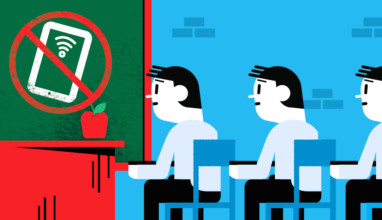
Last week, on the first day of class, I told my students that I do not want to see mobiles on any desks, much less hear any ringing or buzzing. More than that, I told them that I do not allow students to take notes on laptops. That did not make me the most popular professor on campus, but I wanted to stress the importance of paying attention in class, of not distracting others, etc, and what made the pill easier to swallow for the students was that I took the time to explain my reasons and my objectives — which I’ll present to you here.
Smartphone addiction has taken epidemic proportions, and it has greatly affected the educational arena. In a recent survey done at six different universities, students reported using their mobile phones on average 11 times per day in class! In another study, 92 per cent of college students admitted to regularly using their smartphones in class, mostly to send text messages.
And thus, for the past few years, discussions of the issue among educators have greatly increased, debating what to do about the problem: to ban or not to ban smartphones, that is the question! Having had to contend with the problem, I gradually came to the decision of outright banning all electronic devices — except of course in special cases, such as when a student with some disability needs to use a laptop.
Why are smartphones so detrimental to the learning process? Both my personal experience and several recent studies show that students who use their mobiles in class do not perform as well as attentive and disciplined students — all other things being equal. The main problem is attention, focus, listening carefully, taking notes, comprehending the material being presented or discussed, etc, all of which are reduced or worsened when a student turns to his/her smartphone even for a short moment. Secondly, and students do not often realise this, someone switching on any screen, especially if a Facebook page or such is opened, immediately distracts other students sitting nearby. Interestingly, one recent study not only confirmed significant drops in class performance (grades) by students who switch on an electronic device from time to time, but further found that students tend to know that this is not good for them (four out of five acknowledged this) but actually underestimate how bad the effect is.
The usage of laptops in class also tends to correlate with poorer grades and lower academic performance. The reason for that is the students’ inability to use their laptops solely for note-taking; they almost always open another program, mostly non-educational. Even when studying at home or in the library, using laptops tends to lead to loss of efficiency in reviewing and comprehending the material, let alone memorising basic facts and information.
Ah... the myth of multi-tasking. Students have convinced themselves that they are such digital creatures, that they are “wired” to do several things at the same time. They even tell themselves that this is more efficient, because they “do more”. On this also, recent studies have exposed this “multi-tasking” as a myth, showing that trying to do several things at the same time invariably leads to less quality.
But some people might object that there are ways to use smartphones beneficially in the classroom, and that good applications and great activities have been built for that. I agree. I myself have used polling programs in class, where a question is put on the screen and students use either clickers or smartphones to choose an answer among several proposed ones, the instructor then revealing the correct one and discussing the point. This allows the teacher to instantly gauge the level of understanding of a given topic by the students, to clarify some fuzzy parts, etc; it also makes the students pay greater attention. Some professors also give electronic quizzes in class, and smartphones can be used for that too.
Using smartphones for a short while for such activities is of course perfectly fine. My ban does not extend to this.
And what about the “freedom and personal choice” argument, that is if/when a student comes and says “I want to be able to use my smartphone; it’s my problem if this hinders my learning and ends up lowering my grades; I decide when and how to learn; it’s bad enough that this school forces me to attend [all] lectures!” I have never had this specific reaction, but I do understand the argument and the possible situation. My response in such a case would be: “fine, just sit in the back such as not to distract anyone.”
In the end, we educators only want to ensure the best learning conditions and methods for the students. Our experience and our knowledge of research in education allows us to determine the best course of action in a rapidly changing environment. And until something significant changes with regard to electronic devices, I will uphold my ban of smartphones and laptops from the classroom.
Nidhal Guessoum is a professor of physics and astronomy at the American University of Sharjah. You can follow him on Twitter at: www.twitter.com/@NidhalGuessoum.









